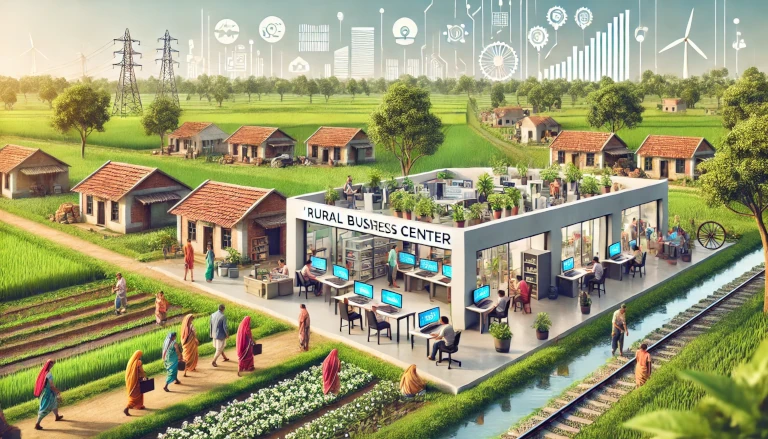A Rural Business Center (RBC) is a hub that supports economic growth, entrepreneurship, and sustainable development in rural areas. These centers play a critical role in bridging the gap between rural and urban economies by offering services, resources, and infrastructure to local businesses and entrepreneurs. The concept of RBCs has gained significant importance in rural development, especially in regions where access to technology, finance, and markets is limited.
What is a Rural Business Center? 🏠
A Rural Business Center is a facility or institution that provides essential services to rural entrepreneurs and small businesses. It functions as a one-stop shop for a wide range of resources such as business training, market access, financing options, and technology support. RBCs aim to foster an environment where local businesses can grow, create jobs, and contribute to the sustainable development of the rural economy.
Why Are Rural Business Centers Important? 🌍
Rural areas often face challenges such as limited access to markets, finance, and technology, which can hinder business growth and development. Rural Business Centers address these challenges by offering tailored solutions that empower local entrepreneurs. Here’s why RBCs are crucial:
- Economic Development: They boost local economies by encouraging entrepreneurship and supporting small businesses.
- Employment Generation: RBCs create job opportunities for rural residents by helping businesses grow and scale.
- Access to Resources: These centers provide resources such as mentorship, skills training, and market linkages, which are critical for business success.
- Sustainability: By promoting local businesses, RBCs contribute to the sustainable development of rural areas, reducing the migration of residents to urban centers.
How Do Rural Business Centers Work? ⚙️
RBCs offer a variety of services that are crucial for rural entrepreneurs and small businesses. These services include:
- Business Advisory Services: Entrepreneurs receive support in creating business plans, managing finances, and identifying market opportunities.
- Access to Finance: RBCs often collaborate with microfinance institutions and banks to provide small business loans or grants to rural businesses.
- Training and Capacity Building: The centers organize workshops on topics such as financial literacy, digital marketing, and product development.
- Technology Support: Many RBCs provide access to internet facilities, computers, and other technologies that rural businesses need to compete in today’s market.
- Market Access: RBCs help businesses reach broader markets by connecting them to online marketplaces, local trade fairs, and buyer-seller networks.
Where Are Rural Business Centers Located? 🏞️
Rural Business Centers are established in rural and semi-urban areas, particularly in regions where infrastructure and business support services are lacking. They are often set up by government bodies, non-governmental organizations (NGOs), or private sector companies in collaboration with local authorities. For example:
- In India, initiatives like the Common Service Centers (CSC) and Rural Business Hubs (RBH) have been instrumental in providing rural entrepreneurs with access to necessary services.
- In African countries, RBCs are being developed as part of rural development projects supported by international organizations such as the World Bank and UNDP.
Advantages of Rural Business Centers 🌟
- Local Economic Growth: RBCs support the development of local businesses, which in turn stimulate the local economy and reduce dependency on urban centers.
- Entrepreneurship Development: By offering resources and mentorship, RBCs empower local entrepreneurs to start and scale their businesses.
- Sustainability: Promoting rural businesses fosters sustainable development by utilizing local resources and reducing carbon footprints associated with urban migration.
- Reduced Urban Migration: RBCs create opportunities for rural residents, which can help reduce migration to cities in search of employment.
Disadvantages and Challenges 🚧
- Initial Setup Costs: Establishing RBCs requires significant investment in infrastructure, technology, and staffing.
- Access to Resources: In remote rural areas, access to high-speed internet, reliable power, and trained personnel can be limited, affecting the efficiency of RBC operations.
- Sustainability Concerns: If not managed well, some RBCs may struggle to remain sustainable over the long term due to funding constraints or lack of support from the local community.
Cost Benefits of Rural Business Centers 💰
While the initial investment in setting up a Rural Business Center may be substantial, the long-term economic benefits outweigh the costs. These include:
- Job Creation: RBCs create employment opportunities for local residents, contributing to economic stability.
- Business Growth: With access to finance, technology, and markets, local businesses can thrive, which boosts local revenues and reduces the economic disparity between urban and rural areas.
- Social Upliftment: RBCs play a key role in improving the standard of living in rural areas by providing income-generating opportunities and reducing poverty levels.
A Vision for Rural Empowerment 🌱
The Rural Business Center model offers an innovative solution to the challenges faced by rural entrepreneurs. By providing access to resources, training, and market linkages, these centers help rural businesses thrive and contribute to the overall development of rural communities. As more countries invest in establishing RBCs, the vision of sustainable and inclusive growth in rural areas becomes achievable.
Discover more from Green Ecosystem - Renewable Energy, Agriculture, and Environmental Sustainability
Subscribe to get the latest posts sent to your email.


